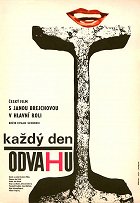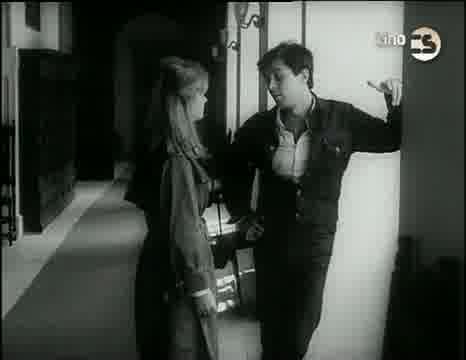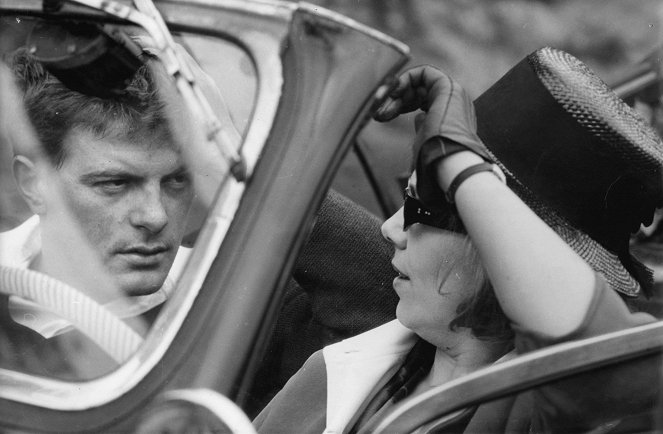Director:
Evald SchormGuión:
Antonín MášaCámara:
Jan ČuříkMúsica:
Jan KlusákReparto:
Jana Brejchová, Jan Kačer, Josef Abrhám, Vlastimil Brodský, Jiřina Jirásková, Olga Scheinpflugová, Václav Trégl, Jan Libíček, Jan Cmíral st., Josef Krameš (más)Sinopsis(1)
Set in post-war Prague, the film follows Jarda, a young outspoken communist worker. He is indignant that his friends are not living up to the ideals of the utopian socialist dream. However, the country is in the midst of social change and he struggles to find his place in the new political climate, realizing that he will never achieve anything in the totalitarian society demanding daily labor feats... (Moscow International Film Festival)
(más)Videos (1)
Reseñas (3)
The occasionally solid tragicomic segments and the semi-sophisticated but effective and above all comprehensible thought shifts are rather devalued by the inconsistent and emotionally disjointed plot, which often jumps between scenes at the expense of rhythmic and communicative continuity, making it impossible to attach to and sympathize with any character. The best are the comic interludes as if cut from life, the psychological aspect is negligible and bland in contrast to many similarly styled period films.
()
One of the few new-wave films that didn’t work with me. Towards the end it looks terribly fateful, the main character seems to be going through a moral crisis and sobering up from the gradual arrival of social changes, but it's all just in such hints that it touched me only in the slightest. The character played by Jan Kačer is very stiff, the only emotion is aroused only by the scene in the pub at the end, and that is not enough. It pisses off Potentate Novotny, which was nice, but otherwise, it's absolutely unlike Three Wishes, a similarly revealing piece, which is six years older. Evald Schorm is simply not my cup of tea, even his most famous The End of a Priest passed me by in a big way.
()
“Who has the power?” Schorm and Máša placed their scepticism about social development in the character of the last great idealist, a man who still believes. But what exactly does he believe? The slogans that he uses have lost their meaning. The society that he wanted to help build has turned out to be an unattainable utopia. Provincial morality has prevailed. Everybody minds their own business. The main thing is to have something to eat, something to drink and someone to sleep with. The young nihilistically disdain all ideals; they gather within themselves only negative, unproductive energy. They still don’t have any life goals. The old lack the will and strength to make changes. They no longer have life goals. The generational parallels are obvious; it’s not a matter of a particular age. Society has lost touch with authentic life (so the excursion of urban intellectuals to the countryside comes across as comical) and is mired in shallowness. Jarda can either helplessly watch this fading of ideals and mass abandonment of responsibility or adapt. But no matter what he decides, will he not be denying his own individuality? The protagonist’s comprehension of this reality is slow and painful, and Schorm observes it without bias. Though he does delve into the protagonist’s private life and does not abandon him even in moments of bliss or utter hopelessness (in my opinion, the former, more relaxed acting approach suits Kačer better than the latter, deliberately theatrical approach), but he does so in the interest of greater vividness of the conveyed moral profile. He does not judge. As in his later films, the supporting characters pay the price for Schorm’s obsession with the central idea, which is filtered through the male lead character. Despite a distinguished performance by Jana Brejchová, this is especially true of the character of Věra, who remains a one-dimensional consoler, spreading waves of positivity around her (Josef Abrhám’s absolutely profligate Bořek brings darkness into the film to accentuate her lightness). In spite of its partial simplification and formalistic simplicity, Courage for Every Day is at its core a powerful and timeless statement about a man and the devastating consequences of his dialectical connection to society. 75%
()



Anuncio